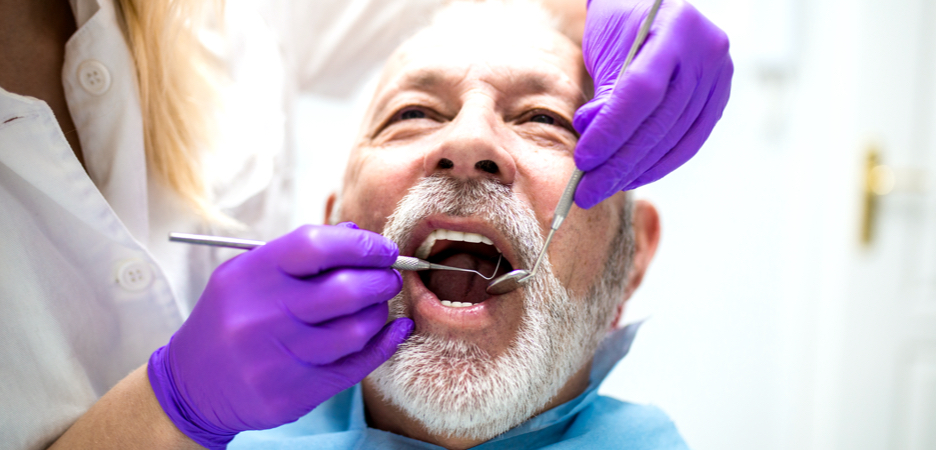

of 5 based on reviews

This November, dentists across the UK have been taking part in the annual Mouth Cancer Awareness Month, a campaign led by charity the British Dental Association to raise awareness of this deadly disease.
Most people have heard of cancer affecting parts of the body such as the lungs or breasts. However, cancer can also appear in the mouth, where the disease can affect the lips, tongue, cheeks and throat – and sadly can kill.
Mouth cancer can affect anybody, whether they have their own teeth or not. Some groups, however, are more at risk. Research indicates that mouth cancers are more common in people over 40, particularly men, although mouth cancer is becoming more common in younger patients and in women. Mouth cancer is now the eleventh most common cancer in the world, with over 640,000 cases diagnosed each year.
There are, on average, almost 8,000 new cases of mouth cancer diagnosed in the UK each year. Unlike other types of cancer, the number of new cases of mouth cancer is on the increase, and in the UK has risen by over half in the last decade alone.
More than 2,300 people in the UK die from mouth cancer every year. Sadly, many of these deaths could be prevented if the cancer was diagnosed early enough. Statistically, people with mouth cancer are more likely to die than those having cervical cancer or melanoma skin cancer.
Although it is impossible to say exactly what causes mouth cancer, most cases are linked to tobacco and alcohol. Cigarette, cigar and pipe smoking are the main forms of tobacco use in the UK. Alcohol increases the risk of mouth cancer, and the risk is even greater if tobacco and alcohol are taken together.
Over-exposure to sunlight can also increase the risk of cancer of the lips.
Scientists have now established a link between mouth cancer and the human papillomavirus (HPV). HPV is the main cause of cervical cancer and affects the skin that lines the moist areas of the body.
According to the British Dental Association,
“HPV can be spread through oral sex, and research now suggests that HPV could soon rival smoking and drinking as one of the main causes of mouth cancer.”
“Practising safe sex and limiting the number of partners you have may help reduce your chances of getting HPV. Many people get HPV during their lives and for many this does not cause a problem.”
There are now HPV vaccines for both girls and boys. They were developed to fight cervical cancer, but it is likely that they will also help to reduce the rates of mouth cancer. These vaccines are given at age 12 to 13 before sexual activity starts.
Mouth cancer affects people in different ways. It can appear in many different forms and can affect all parts of the mouth, tongue and lips. For some, mouth cancer can appear as a painless mouth ulcer that does not heal normally. Others may develop a white or red patch in the mouth.
Key warning signs include unusual lumps in your mouth or jaw area, persistent hoarseness, or soreness that does not heal within three weeks. If you experience any of these symptoms, it is imperative that you visit your dental team or doctor as soon as possible.
Dentists are trained to recognise what is normal and what is not, and can often spot the early signs of mouth cancer during your routine dental checkup. If mouth cancer is diagnosed early, then the chances of a cure are good, but many people with mouth cancer still go to their dentist or doctor too late.
A thorough dental checkup will include an examination of the inside of your mouth and your tongue with the help of a small mirror. Your dentist will also look at your neck and underneath your jaw. Remember, even if you are vigilant, your dental team can see parts of your mouth that you cannot see easily yourself.
If your dentist finds something unusual, they will refer you to a consultant at the hospital, who will carry out a thorough examination of your mouth and throat. A small sample of the cells may be gathered from the area (a biopsy), and these cells will be examined under the microscope to see what is wrong.
If the cells are cancerous, further tests will be carried out. These may include overall health checks, blood tests, x-rays or scans. These tests will decide what course of treatment is needed.
If mouth cancer is spotted early, the chances of successful treatment are good, and the smaller the area or ulcer the better the chance of a good outcome. However, too many people come forward too late because they do not have regular mouth examinations and this can seriously reduce the likelihood of successful treatment and recovery.
To book a dental checkup now or enquire about becoming a member, get in touch with the team at Stella Maris Dental today. Call now on 0121 588 4541.

Book your next appointment, arrange a consultation or enquire about becoming a member of our award-winning dental practice.
Enquire Now

Don’t compromise your dental care by going for second best or delaying treatment. Go for the very best that modern dentistry can offer and spread your investment with our 0% finance.
* Up to 18 months is interest free. If you would like to take finance over a longer period then an interest charge will apply.
** Interest free finance spread across up to 18 months for treatments valued over £300.00